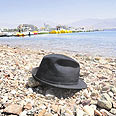
Status quo? An Eilat beach
צילום: יוסי דוס-סנטוס
Is Eilat turning religious?
New synagogues, wider range of religious services and increase in number of observant city councilmen – it seems southern resort city has never been more religion-friendly
Eilat, Israel's southern resort city and a place practically synonymous with secularism seems to be rediscovering faith.
The city's synagogues are growing in numbers, more and more of its councilmen are religious and many hotels are observing kosher laws with newfound devotion.
Eilat has a purely secular reputation, but some 20% of its residents are religious. Until several years ago, most of the city's synagogues were located in shelters, but more and more of them have found permanent homes – above ground. New synagogues are also being built to meet the growing demand.
Another sign of the city's new traditional trend is the growing number of mikvehs (Jewish ritual bath) – the city now sports three; as well as in the growing number of hesder yeshivot and girls' seminary schools.
The city council's weekly meetings reportedly begin with reviews of the biblical portion of the week and photos of rabbis meeting those entering City Hall.
Eilat's City Council numbers 17, five of whom are religious. Religion's growing power is evident mostly in the fact that two key positions in the council – deputy mayor and head of the emergency services – are held by Shas councilmen.
Back to basics?
"Eilat still has a secular majority," a local cab driver said. "Yes, we are seeing an increase in religious observance in the past few years, but this is a 'live and let live' town and I hope it stays that way."
Eilat, said another resident, is no different than any other city in Israel: "There is an overall trend of becoming more observant and Eilat is no different. It wasn't too long ago that a national survey said only 42% of Israelis defined themselves as seculars and the rest said they were Orthodox, religious and observant."
Still, he does not think Eilat is becoming as religious as it is made out to be, saying the city has a healthy status quo, which its chief rabbis work hard to maintain.
A former Eilati politician added that the change noted in the southern city is proportionate to its population growth.
Eilat, he believes, "Is becoming even more religious since city officials understand the electoral power of the city's religious sector… Still, as long as you maintain the status quo and a positive atmosphere, there is room for everyone."
No religious rush
Haviv Hazizah, head of Eilat's Religious Council does not think that the city is becoming that more religious.
"The assumption that the Eilati people are becoming more religious is untrue. There is a vast public that is observant – too many for the synagogues to house – which is why we're building more synagogues.
"There is no religious coercion in Eilat, but naturally, there is need for basic religious services. Erecting more synagogues brings people closer together," he said.
Chief Rabbi of Eilat Yosef Hecht, echoes the sentiment, saying Eilat is not becoming religious, but rather that "the natural growth of the city included religious people, observant people and those who have reformed.
"Over the past few years we have seen growing presence in synagogues – which is a blessed in itself – but this is nothing unique to Eilat, but a process evident throughout Israel. Nevertheless, the balance in Eilat is kept and the city's character remains unchanged," said Rabbi Hecht.
As for the city's hotels – they keep kosher because they are frequented by observant customers, a veteran hotelier said.
A kosher certification is not easily obtained, he explained, but the religious establishment allows Eilat some leeway – given the city's unique nature.
"Eilat has always been the exception to the rule. If hotels in other cities refrain from playing music on Shabbat because of the religious councils, there are certain mitigations in the matter in Eilat – but not by the grace of the religious councils. It's because the city's hoteliers fight for it.
Kosher limitations, he added, have created difficulties for hotels, which are required, for example, not to cook on Shabbat. "We observe all kosher laws and we don't serve pork, but if we use machines on Shabbat our kosher certification could be revoked.
"The kosher certification," he concluded, "Is our way to entice the religious public to enjoy the services we provide."
- Follow Ynetnews on Facebook










